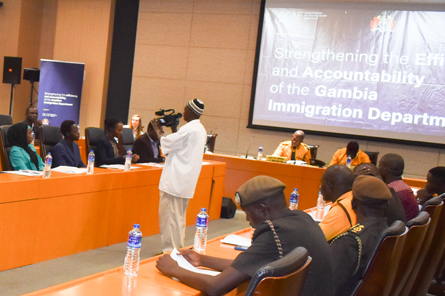The Gambia
Since the election of President Barrow in late-2016, the administration has initiated a series of comprehensive reforms and processes covering transitional justice, constitutional reform, national development, and security sector reform (SSR). Aligned with this agenda, DCAF has been an important actor in the SSR process in the Gambia since its inception in 2017.
Since 2021, our efforts focus on the implementation of reforms of key security institutions, and specifically the Gambian Police Force (GPF) and the Gambian Immigration Department (GID), through a joined EU and Swiss funded programme aimed at improving the effectiveness, management, and accountability of these two institutions.
Read our factsheet to get an overview of DCAF's work in the Gambia.

Workstreams/Projects
- provides policy makers and security actors with access to evidence and data, and the opportunity to participate in SSR-shaping dialogues
- strengthens the capacity of parliament, civil society, and the media to effectively provide oversight of the security sector
- provides expertise on legal frameworks, policies, and human resource management of security institutions
Achievements:
Ensuring that security institutions’ operations and performance are guided by clear and consistent visions and policies, while strengthening their leadership and management is essential to greater effectiveness and efficiency of security institutions. To this end, DCAF has:
- Developed key performance indicators for both the GID and GPF which will link policy/strategy aspirations with visible and impactful improvements at operational level that can more directly influence community security.
- Enhanced line management and supervision through the provision of leadership and management trainings at strategic, operational, and technical levels.
- Supported the development of tools and a guidance document on Crisis Management, that were used by the GPF in the framework of the presidential and parliamentary elections in, respectively, 2021 and 2022.
- Undertaken a thorough analysis of the structure of the GID, identifying the main gaps, and provided advices and support for restructuring the organization.
- Produced several knowledge products to inform the security sector reform agenda, most notably:
- an institutional Human Resources Assessment of key security institutions (Army, Police, Immigration, Intelligence services and line Ministries);
- a perception study of the population in the field of security.
With a view to reinforcing internal oversight structures and normative frameworks of security institutions, while improving the capacity of external oversight actors to hold to account security institutions in their performance and conduct, DCAF has:
- Mapped stakeholders and supported the development of a GPF complaint handling system allowing for scrutiny and management of public complaints on cases of misconduct and performance of security institutions.
- Delivered training to improve and strengthen the skills and knowledge of CSOs and journalists in their role and responsibilities of promoting, monitoring, and reporting on electoral security and integrity.
- Conducted bespoke oversight training programs for the Ministry of Interior (MOI), Office of National Security (ONS) and the National Assembly Standing Committee on Defence and Security (SCDS).
Achievements:
Legal reform processes represent an integral and essential part of SSR processes. A robust and efficient legal framework is critical for a democratic and efficient security sector and institutions should be regulated by and operated according to clear, up to date legal and policy frameworks that comply with international and regional standards and norms. To this end, DCAF has;
- developed the first-ever police doctrine for the GPF aligned with international standards, enshrining its mission, vision, values and overarching principles of policing.
- supported the development of a revised immigration bill, that shall set the overarching legal framework of the GID’s mandate, powers, and structure.
- worked with the Ministry of Justice to ensure that laws governing the security sector are fully compliant with democratic principles, the rule of law and human rights.
- conducted an assessment of all legal frameworks governing the security sector
- developed a legal database in partnership with the Office of National Security (ONS), which provides access to the legislations and policies governing the security sector in The Gambia.
- supported the development of new legislations governing the Gambian Armed Forces and the State Intelligence Services.
DCAF’s efforts are constantly guided by the need to uphold human rights and gender equality within security institutions at the policy and operational level and promote dialogue between communities and the security sector on human rights and gender. To realize this, DCAF has:
- Provided support to strengthening women’s career opportunities and leadership in the GPF through barrier assessment, capacity-building, leadership engagement, policy review, and establishment of mentorship and networking mechanisms for female police officers.
- Mainstreamed gender into GPF and GID’s policies (including through the development of dedicated Gender Policies), procedures, and operations through the development of specific administrative procedures as related to sexual harassment, and dedicated capacity building efforts on gender mainstreaming.
- Conducted a gender survey of the justice and security sector, complemented in 2023 by a gender study specific to the GID.
- Mainstreamed the promotion and respect of human rights by security personnel specifically in the framework of elections, as well as obligations under international law, refugee law and humanitarian law.
- Enhanced dialogue on and common understanding of the role of women, traditional, religious and youth leaders in the prevention and mitigation of electoral violence through community sensitization.
Key Resources
Contacts
Anne Bennett, Head of Sub-Saharan Africa Division (a.bennett@dcaf.ch)
Sophie Frediani, Principal Programme Manager (s.frediani@dcaf.ch)
Ken Isaac, Head of Office, DCAF in Banjul (k.isaac@dcaf.ch)


